- Home
- R. A. Spratt
The Final Mission Page 5
The Final Mission Read online
Page 5
‘You choked them, didn’t you?’ said April.
‘Maybe a little,’ said Mum with a shrug.
‘And you let them dump the potato anyway?’ asked Dad. He was very rarely angry, but the thought that his former wife had knowingly allowed such gross vandalism of his flowerbeds was making him emotional.
Mum shrugged again. ‘It seemed reasonable enough. Fin gave his word he’d fix it. It’s important to be true to your word.’
‘You weren’t true to your word when you married Dad,’ April pointed out.
‘I was true to some of them,’ said Mum, giving April a sidelong glare.
‘You started lying from the second word you said,’ accused April. ‘I’ve heard the wedding vows. The bride says “I Bertha Anne Banfield.” There you go, you were using a false name. So you started lying at word two.’
‘Bertha is my real name,’ said Mum.
‘What about Anne Banfield?’ asked April.
Mum did not respond.
‘I stand corrected,’ said April. ‘You started lying from word three.’
‘Er . . .’ said Dad, ‘so to get back to the point, when you were discussing with these delivery people whether or not they could leave a giant potato in our yard, it didn’t occur to you to suggest that they leave it somewhere other than on top of one of my prize flowerbeds?’
‘It was dark, and I had a six-foot tall 120 kilogram man in a headlock,’ said Mum. ‘I didn’t stop to identify the species of vegetation underneath the potato.’
‘Hmm,’ said Dad.
This was about as close as he got to being in a towering rage. But the kids knew he was upset because he was quivering like a dog in a thunderstorm who would dearly like to hide under the bed but can’t fit under there.
‘I’ll move it, Dad,’ said Fin, getting up from the table.
‘How are you going to do that?’ said April. ‘It must weight half a ton.’
‘The same way the Egyptians built the pyramids,’ said Fin. ‘I’ll roll it.’
‘The Egyptians didn’t build the pyramids,’ said April.
‘Oh what? Are you going to tell me it was aliens?’ asked Fin.
‘No, slaves built the pyramids,’ said April. ‘The Egyptians just said, “put it over there”.’
Fin rankled. Like all people who loved correcting others, he hated being corrected himself. Especially when it was his sister. And extra especially when she was right. ‘Well the potato is round. I can roll it over to the shed and put it next to Dad’s homemade helicopter,’ muttered Fin, as he tromped out the French doors.
‘Should one of us go and help?’ asked Loretta, but without making any move to do anything herself.
‘No,’ said April. ‘That would ruin the fun of watching him do it.’
Even Joe, who normally helped everyone, even he kept on buttering his toast and shoving it in his mouth as he watched out the window. Fin corrected him a lot too. And, as ever, Joe was really hungry. He was in no rush to get up from the table.
They watched Fin trudge across the yard. As he approached the potato he appeared to shrink. It was just a trick of perspective. The size of the huge potato dwarfed him. Fin paused to take in the situation for a moment, then picked a side, having evidently made some calculation about which way would be easier to move. Dad’s garden was relatively flat and the lawn was well maintained. Once it was down from the flowerbed there would be no obstacles between there and the shed to negotiate. The trick was getting it off the flowerbed.
Dad liked to add a lot of organic matter to the soil and by ‘organic matter’ I mean manure, so the bed was a good foot higher than the lawn. Fin just needed to get the Giant Potato moving an inch or so, then it would roll down off the bed, and he should be able to use the momentum to keep it rolling the thirty metres to the shed. Logically it seemed easy enough, but logic never goes as well in real life as it does in somebody’s head.
Fin stood on the far side of the potato, placed his hands on the giant sculpture, braced his feet against the grass and pushed as hard as he could. This might have worked if Fin had been wearing golf spikes or some other sort of studded footwear. But he was not.
Dad, for all his faults as a human being – cowardice, bad dress sense, constant weeping – was really good at looking after his garden. He irrigated it like clockwork. Literally, there were timers set to go off at specific times throughout the day, and it had been the lawn’s turn to get watered just half an hour earlier.
So when Fin put his hand against the potato and pushed with all his might, his worn-out school shoes slipped on the wet grass and he fell face down in the flowerbed. Which, as I have already mentioned, had a very high manure content. Not a pleasant experience.
Fin could hear his family’s laughter from inside the house. He didn’t look across. Better to pretend he didn’t know they were watching. He would move this potato. Joe might have brute strength, but if you had an extensive understanding of physics, as Fin did, then you didn’t need strength.
Admittedly Fin had initially forgotten to allow for the lack of traction in his shoes, but now that he was aware of the issue he could overcome it. There had to be a way. Fin thought about this for a moment as he scraped the larger chunks of manure off his face.
He stepped up onto the mulch. His feet sank into the organic mixture. This was good. It would give him more traction, a firmer hold to push from. Plus the activity of the microorganisms decomposing the mulch were making his feet feel pleasantly warm. Fin placed both hands against the potato again, he leaned forward and pushed with every muscle fibre in his body. And miracle of miracles, he actually felt it start to move!
Just a millimetre at first but then a little more, a centimetre, and a little more speed. Fin pushed harder to increase the momentum. The potato lurched, hit an irrigation post on the other side of the flowerbed and rocked back. Now all the momentum of the half-ton potato was rolling the other way towards Fin. It took a millisecond for his brain to realise what was going on. Unfortunately, it would take much more than a millisecond to extract his feet. They were now entirely sunken in the bed. The huge potato rolled back, knocked Fin flat and rolled right over the top of him.
The entire family exploded out of the house. Pumpkin barked wildly. Tears were already streaming down Dad’s face. April was first to get to the potato, but Joe and Mum weren’t far behind. They ran up onto the flowerbed and pushed the giant spud. They were all stronger and more athletic than Fin. Once Loretta and Dad joined them, and added their strength to the effort, they soon had the potato off him. Fin had only been pinned underneath for three seconds, but the Peskis were horrified to imagine what state he would be in under the huge half-ton fake spud.
The answer – Fin was fine. Dad’s lawn was so lush and thick, the potato had simply pressed him into the turf. The grass had acted like bubble wrap supporting the weight of the potato and protecting Fin beneath. Fin was physically intact. Although from the look of absolute frozen fear on his face, there may have been extensive emotional and mental damage.
‘Are you ok-k-kay?’ asked Joe.
Fin’s mouth opened and closed but no sound came out.
‘Of course he’s not okay,’ said April. ‘He’s Fin. He never has been okay. He’s always been touched in the head. You should be asking “are you still as annoying and weird as you were five minutes ago before you were run over by a giant potato?”’
Joe looked down at Fin. ‘Are you?’
Fin still could not speak. He was just lying flat on his back, trembling. He had an overwhelmed look in his eyes. Like he couldn’t comprehend what had happened to him.
Loretta leaned in to get a closer look at his face. ‘Would you like me to kiss you better?’
If Fin was already in shock, he now went into double shock. It was a miracle his organs didn’t shut down entirely. He must have been dead. There was no way Loretta would be offering to kiss him in reality.
But she did. She bent over and kissed Fin on the forehead
. He distinctly felt lips. That was it. Poor Fin couldn’t take any more. He passed out.
Dr Singh, Currawong’s incredibly elderly and deeply unimpressive doctor, was standing over Fin as he lay on a bed in the emergency room. Dad, Joe, April and Loretta were all there too. Mum had stayed at home. She didn’t like being in hospitals. There were too many weapons your enemy could use to attack you.
‘You say – he was run over by a truck?’ asked Dr Singh. ‘It’s a miracle he’s alive.’
‘No,’ said Dad. ‘I said he was run over by a potato that was the size of a truck.’
Dr Singh leaned in and watched Dad’s mouth carefully as he said this. Apart from showing early signs of dementia, Dr Singh was also very deaf. ‘A potato the size of a truck?’ repeated the doctor.
Dad nodded.
Dr Singh peered at Dad more closely. ‘Would you like to lie down on one of these other beds?’ he asked kindly. ‘We could have someone from the mental health team come over from Bilgong to have a chat with you.’
‘Oh no, Dr Singh,’ said Loretta, taking the elderly doctor by the hand. ‘It is entirely true. Poor dear Fin did have a potato roll over him. We don’t want any mental health checks today. We just need you to confirm that Fin hasn’t broken any bones, and that there’s no internal bleeding.’
‘Oh no,’ said Dr Singh. ‘Nothing like that. If there was internal bleeding, he would look much sicker.’
‘And his b-b-bones?’ asked Joe.
‘Well, I couldn’t see any sticking through the skin,’ said Dr Singh. ‘But if you think I’ve missed something, you can always bring him back.’
‘What about brain damage?’ demanded April. ‘Obviously he’s always had extensive brain damage, but is it any worse?’
‘We’d have to get a CAT scan to be sure of that,’ said Dr Singh. ‘You’d have to go to the city.’
‘If he’s got brain damage, it’s already done so there’s no point fussing about it,’ said April. ‘Does that mean we can take him home?’
‘If you want to,’ said Dr Singh. ‘But it’s baked potatoes for lunch today, plus a Dixie cup on the side. We have patients who pretend to be ill on Tuesdays just to get that.’
‘Nooo,’ whimpered Fin. ‘No more potatoes. Take me home!’
‘All right, we will,’ Dad assured him.
Fin grabbed Dad’s wrist. Dr Singh appeared to have overlooked what were clearly the signs of concussion or shock, most likely both. ‘There has to be a safer way to move a potato.’
‘Safer than rolling it over yourself?’ asked Dad. ‘I’m sure there is.’
‘I will find a way,’ said Fin. ‘So no one else ever has to go through this ordeal.’
‘I’m pretty sure in the entire 100,000 year history of the evolution of humankind that no one else has ever run themselves over with a giant potato before,’ said April. ‘It’s not a problem that comes up a lot.’
‘It will be worth it,’ said Loretta. ‘You’re going to be a hero for fixing the potato. It’s a tribute to Dame Bronwyn. It’s got to look good for her visit.’
‘Did you say Dame Bronwyn?’ asked Dad. ‘The Dame Bronwyn, mother of the Bronwyn Brown?’
‘Yes,’ said Loretta.
‘She’s coming here?!’ asked Dad.
‘Yes,’ said Loretta.
‘Oh my goodness!’ exclaimed Dad. ‘Come on, Fin. No time to lie about. We’ve got to get home.’ Dad rushed out of the ward.
‘What’s got into him?’ asked Loretta.
‘Potatoes on the brain,’ said April.
When the Peskis got home, Joe and Loretta helped Fin up to his room.
Meanwhile, Dad had rushed off to his office. Mum knew Fin was okay, but she wasn’t sure about Dad’s erratic behaviour so she followed him.
‘What are you doing?’ asked Mum. She was bemused by the man her husband had become. He was still the same old Harold, but he was also different. He was still weak and even more cowardly, but she couldn’t predict what he was going to say or do any more. Sometimes he seemed to have totally disconnected himself from reality. It was no surprise, really. It was probably a self-defence mechanism.
Mum felt bad. When she met him, Dad had been charming in a shy way. She had done the damage that turned him into this. Mum was a trained operative. She was used to crushing people – sometimes she crushed them psychologically, sometimes physically, once she’d even crushed someone with a steamroller – but those were wicked people, doing damage to international institutions and world peace. They deserved it. She had crushed Dad’s fragile grasp of sanity, and he had been a nice man. Like an innocent bystander on the footpath who gets wiped out when a cop car jumps the kerb in a high-speed police chase.
‘I can’t believe she’s coming here! To Currawong!’ Dad gushed excitedly. He was in his office, flicking through books from the bookcase.
‘But what are you looking for?’ asked Mum.
‘The bible,’ said Dad.
Mum was shocked. Dad had never been very religious. Was this another thing she didn’t know about him?
‘Ah-hah!’ exclaimed Dad. He had spotted something on the top shelf. Dad reached up but he wasn’t tall enough. He put his foot on the bottom shelf and stepped up. The bookcase started to teeter forward precariously.
‘Harold, be careful,’ warned Mum.
Dad grabbed the book he wanted with his fingertips and pulled it out. A shower of other books fell and hit him on the head, but Dad barely noticed. He jumped down and the bookcase tottered back into its upright position. Mum breathed a sigh of relief.
‘This is it!’ said Dad. He was holding a small green book.
‘That doesn’t look like a bible,’ said Mum.
‘It’s the bible of potato growing,’ said Dad. He was beaming a smile of pure unadulterated joy. ‘Dame Bronwyn wrote this book forty years ago. It is a work of genius. Her insights into tubers are unparalleled to this day.’ He opened the book and flicked through it. Mum could see there were highlighted and underlined sections. Many pages were dog eared. It had clearly been read many times. ‘I can’t believe she’s coming here! Do you think she’ll sign it for me? It would be such an honour.’
Mum watched Dad’s face flicker between hope and anxiety. Like a little boy about to go and tell Santa what he wants for Christmas.
‘I’m pretty sure she’ll sign it,’ said Mum. ‘I doubt she gets hounded by autograph hunters.’
‘I hope you’re right,’ said Dad, optimistically. ‘But she should be hounded.’
‘Really?’ asked Mum. She was naturally suspicious, so her mind leapt to the possibility that Dad knew something about her dark past.
‘Oh yes,’ said Dad. ‘Her work is so brilliant. If there was a Nobel Prize for horticulture, she would have won it hands down.’
‘Oh,’ said Mum.
‘You think I’m exaggerating,’ said Dad, suddenly serious, ‘but you shouldn’t underestimate the importance of the potato to international security.’
‘What?’ said Mum. Her heart sank. If Dad thought potatoes were involved in international relations, then he was clearly even nuttier than he looked.
‘Food security is the most essential public service every government must ensure to maintain the welfare and morale of their people,’ said Dad. ‘The Russian Revolution was triggered by lack of bread, the French rose up when Marie Antoinette told them to eat cake, and the Irish mass migrated because of the potato famine.’
Mum’s brow furrowed. Perhaps she was the one losing her grip. What Dad was saying to her actually made some sense.
‘Effective agricultural practices ensure food security,’ said Dad. ‘And food security is the most essential type of security society needs.’
‘Which is why Dame Bronwyn is so important?’ asked Mum.
‘Her potato is a modern marvel,’ said Dad. ‘The Bronwyn Brown is drought tolerant, flood tolerant, rust resistant and bug repelling. It’s a super spud.’
‘Right,’ said Mum. She was start
ing to swing back to her initial opinion that Dad was barking. She would have to sort out this mess alone. ‘I’m going to need a computer to do some work. Do you still have that old desktop, the one you did your Masters on?’
‘Oh yes,’ said Dad.
‘Great,’ said Mum. ‘I’ll use that. If you tell me where it is, I’ll be able to sort it out myself. You can get on with your . . . work here.’
‘It’s out on the lawn,’ said Dad.
‘What?’ said Mum.
‘Fin made it into a water feature,’ said Dad. ‘For my aquaponics pond. I use it to cycle fertilised water through my hydroponic set up in my glasshouse.’ Dad pointed out the window to the water feature in the garden. Water was cascading over the old desktop into an antique bathtub.
‘It’s in a pond?’ asked Mum. ‘But what about all the information on the hard drive?’
‘Well, that won’t have been ruined by the pond,’ said Dad.
‘It won’t?’ said Mum.
‘No, the hard drive would have been ruined by the fire, the fall from the second-storey window and the water Joe doused it with to put it all out,’ said Dad.
‘You burned, smashed and soaked it?’ asked Mum. She was starting to go white with shock. All her secrets had been hidden in that computer. Even the ones she kept from Maynard.
‘But don’t worry,’ said Dad. ‘I’ve got a printout of the database you had hidden inside.’ Dad went over to his desk, slid open the bottom drawer and pulled out a wad of old dot matrix printed paper. ‘Is this what you want?’
‘You found my secret database?’ asked Mum.
‘Yes,’ said Dad. ‘Well . . . me and Ingrid.’
‘Ingrid!’ Mum was starting to yell now. ‘You let her see this? So Swedish intelligence knows every name on that list?’
‘I suppose they would, if Ingrid told them,’ said Dad.
‘Of course they would,’ yelled Mum. ‘She’s a Swedish operative.’
‘But anyone could have this list,’ said Dad. ‘In fact, everyone in Currawong does.’
‘What on earth are you talking about?!’ said Mum.

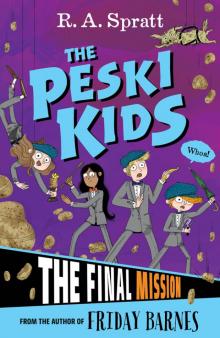 The Final Mission
The Final Mission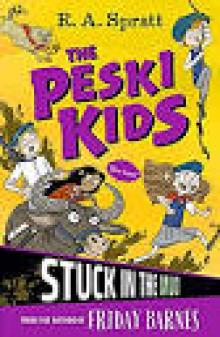 Stuck in the Mud
Stuck in the Mud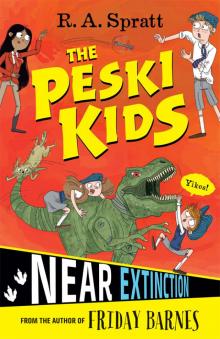 Near Extinction
Near Extinction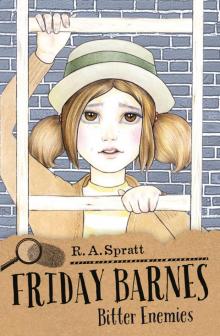 Bitter Enemies
Bitter Enemies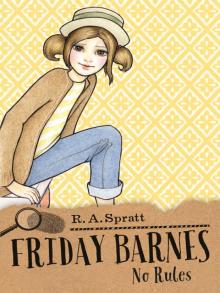 No Rules
No Rules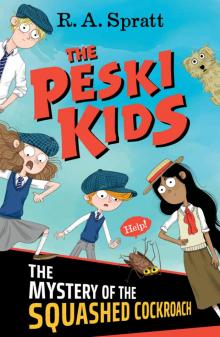 The Mystery of the Squashed Cockroach
The Mystery of the Squashed Cockroach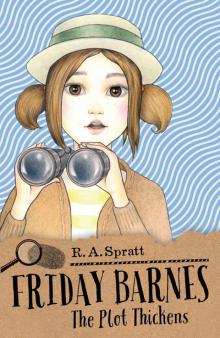 The Plot Thickens
The Plot Thickens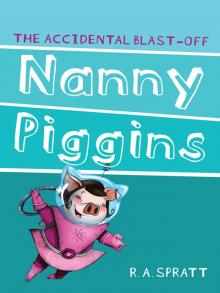 Nanny Piggins and the Accidental Blast-off
Nanny Piggins and the Accidental Blast-off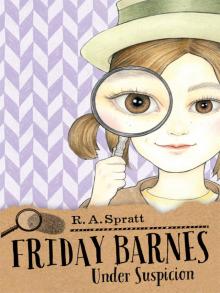 Friday Barnes 2
Friday Barnes 2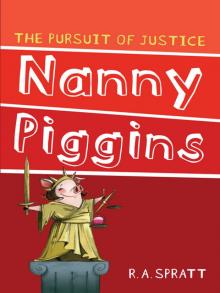 Nanny Piggins and the Pursuit of Justice
Nanny Piggins and the Pursuit of Justice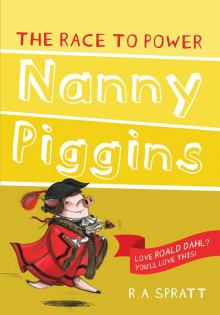 Nanny Piggins and the Race to Power 8
Nanny Piggins and the Race to Power 8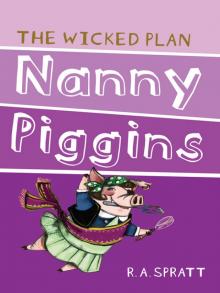 Nanny Piggins and the Wicked Plan
Nanny Piggins and the Wicked Plan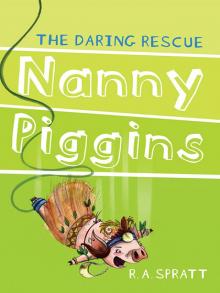 Nanny Piggins and the Daring Rescue 7
Nanny Piggins and the Daring Rescue 7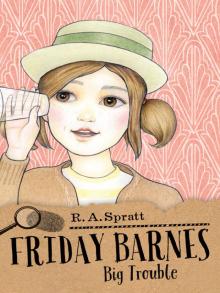 Friday Barnes 3
Friday Barnes 3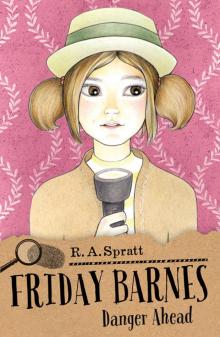 Danger Ahead
Danger Ahead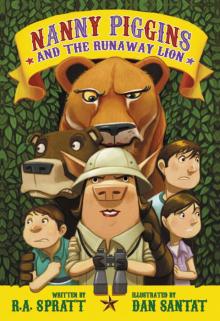 Nanny Piggins and the Runaway Lion
Nanny Piggins and the Runaway Lion The Adventures of Nanny Piggins
The Adventures of Nanny Piggins